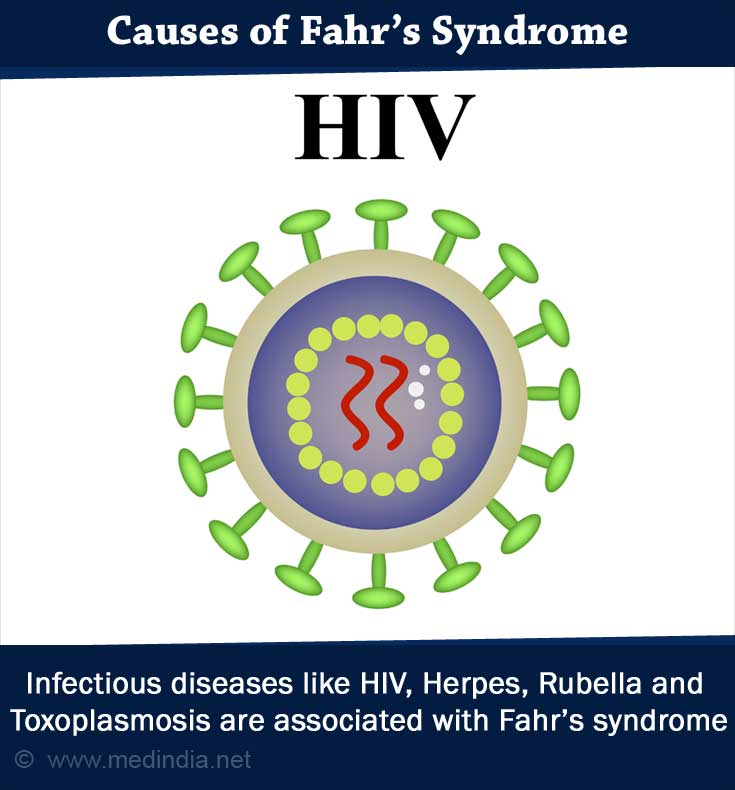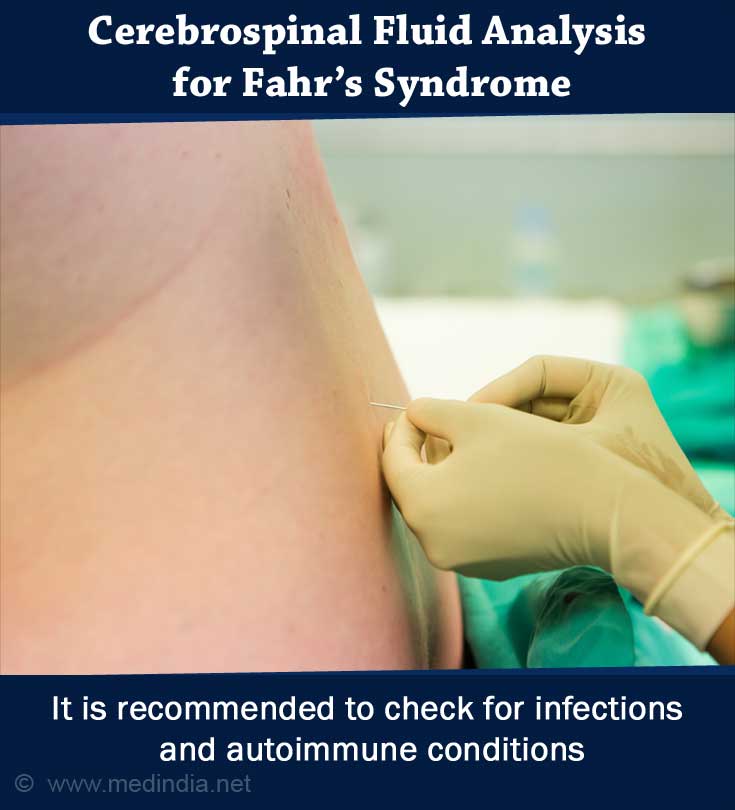- Fahr syndrome - (https://radiopaedia.org/articles/fahr-syndrome-1?lang=us)
- Fahr’s syndrome: literature review of current evidence - (https://ojrd.biomedcentral.com/articles/10.1186/1750-1172-8-156)
- Fahr’s syndrome: diagnosis issues in patients with unknown family history of disease - (http://www.rjme.ro/RJME/resources/files/500309425428.pdf)
- Gülsün, Murat, Baykız, Ali Fuat, Kabataş, Serdar et al. (2006). Fahr syndrome: Three cases presenting with psychiatric signs. European Journal of General Medicine, 3(1):35-40 - (http://www.bioline.org.br/pdf?gm06008)
What is Fahr’s Syndrome?
Fahr’s Syndrome is an inherited, genetic disorder characterized by abnormal deposits of calcium in brain areas which control movement. Calcium deposits in the basal ganglia, cerebral and cortical regions (parts of the brain areas) leading to atrophy. This mineral deposit causes significant neuron (brain cell) loss, leading to motor and mental disabilities.
Inheritance and Genetics in Fahr’s Syndrome
The molecular genetics of Fahr’s syndrome is under-researched, therefore molecular and genetic evidence is limited. However, the gene IBGC1 has been identified as one of those causing idiopathic basal ganglia calcification. A second locus for the genetic pathophysiology of Fahr’s is identified as chromosome 8 and chromosome 2. Fahr’s syndrome usually affects individuals in their 40s and 50s though it may sometimes occur in childhood or adolescence. The disease prevalence is less than 1 in 1,000,000.
Symptoms of Fahr’s Syndrome
Individuals affected with Fahr’s present a range of neurological, neuropsychiatric, memory loss, Parkinsonian and chorea-like symptoms. The clinical features are:
- Neurological disorders – seizures, loss of consciousness, spasticity, gait issues, speech impairment, memory loss or dementia-like symptoms, chorea (dance-like movements), athetoid tremors and movements and dystonia (muscle spasms).
- Movement disorders – unsteady gait, lurching, slurred speech, clumsiness, involuntary movements and dysphagia (difficulty in swallowing).

- Neuropsychiatric disorders – vary from mild to severe symptoms. Individuals may present with mild memory loss to total loss of identity. There may be behavioral and personality changes. Some individuals also present with psychosis.
Etiology / Causes of Fahr’s Syndrome
Some of the causes attributed to Fahr’s syndrome include:
- Endocrine disorders – parathyroid disturbances are associated with Fahr’s. Endocrine disorders disturb the body’s metabolism including serum calcium concentration which can lead to excessive calcification in brain areas. Vitamin D disturbance is also an associated condition.
- Mitochondrial myopathies – are also associated with calcium metabolism. The most common radiological finding in mitochondrial myopathies is basal ganglia calcification.
- Dermatological issues – are correlated to basal ganglia calcification. One such condition is known as lipoid proteinosis which results in symptoms like seizures, dementia, hair loss, photosensitivity and dwarfism.
- Infectious diseases – also play a role in basal ganglia calcification. Infections like HIV, herpes, rubella and toxoplasmosis are associated with Fahr’s.

Normal aging also leads to calcification in the basal ganglia in elderly individuals. However, this rarely leads to Fahr’s syndrome.
Diagnosis of Fahr’s Syndrome
Neurologists and psychiatrists usually evaluate the individual taking into account his/her general health, family genetic history, personal medical and genetic histories. Some of the diagnostic tests involved in Fahr’s include:
- Imaging – a CT scan is usually recommended to detect calcification. Sometimes an MRI is also necessary.
- Blood tests – like serum calcium, phosphorus, manganese and alkaline phosphatase are also recommended.
- CSF analysis – cerebrospinal fluid analysis is recommended to check for infections and autoimmune conditions.

Diagnosis of Fahr’s requires great skill as many of the symptoms are similar to other neurological and neuropsychiatric disorders. Diagnosis is usually done taking into account clinical symptoms and ruling out other causes.
Management of Fahr’s Syndrome
Diverse treatment approaches are used to stabilize individuals with Fahr’s syndrome. The goal is mainly to alleviate symptoms and keep the individual comfortable and pain free. Pharmacological drugs are usually used to control anxiety, depression and psychosis. Antiepileptic drugs like Carbamazepine and Benzipenes are used to control seizures. Antipsychotic agents like lithium are used to alleviate mood swings and depression. However, lithium should be used with caution as it can increase gait issues like lurching and swaying.
Vitamin D-related Fahr’s symptoms may be alleviated with doses of alpha hydroxy vitamin D3.
Treatment and management of Fahr’s is multidisciplinary involving caregivers, genetic counsellors, psychiatrists, neurologists, endocrinologists and other physicians. There are currently no standard protocols for management of Fahr’s. Doctors and health care specialists manage individuals on a case-by-case basis.

Future Perspectives
While the current research focus is on pathophysiological mechanisms leading to calcification in brain areas, there is also the need to further explore safe treatment options. Many of the drugs used currently are not well tolerated and have side effects impacting hormonal, liver and kidney function. There is a need to evolve treatment modalities that prevent loss of neurological function and degeneration.







